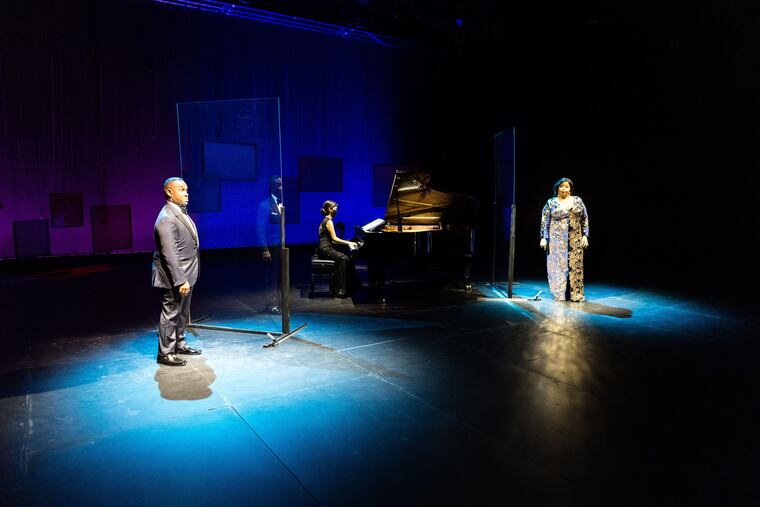Opera Philadelphia’s digital season starts now: What to expect
"When I first arrived in Philadelphia, I said ‘We want to be the HBO of opera,’ " says general director David Devan. "Be careful what you wish for.”

Only in our age of social distance would an opera promo ending with “See you on the couch” be perfectly innocent.
The mostly-digital Opera Philadelphia season that it promotes, opening Friday, shows the company doing what it now has to do: Explore new ground, literally. Friday’s program, Lawrence Brownlee & Friends in Philadelphia, is a concert of solos and duets — sung with the performers separated by Plexiglass panels. The ambitious Soldier Songs, later on the schedule, was shot outdoors in the Brandywine region.
Those and three other Opera Philadelphia video events will be seen on the newly established Opera Philadelphia Channel — a new technological horizon designed for streamed content to synch with all manner of home viewing devices, at operaphila.tv.
Flexibility comes naturally for an international opera star such as Brownlee: “I learned not to copy anything I have seen before. You have to bring your own personality for it to project to the cameras.”
And Opera Philadelphia general director David Devan almost predicted the pivot to digital. “When I first arrived in Philadelphia [in 2006], I said ‘We want to be the HBO of opera,’ " he says. "Be careful what you wish for.”
Among the passages in David T. Little’s Soldier Songs is one of a grieving father setting a parked car on fire, so the outdoor video shoots were warranted. For heightened realism, baritone Johnathan McCullough (the focal point of the song cycle) is singing live on camera rather than lip-synching. “It’s very rich … and different from everything you’ve seen before,” says music director Corrado Rovaris, who conducted and recorded the chamber music score ahead of the shooting.
The other video programs on the channel are the company’s acclaimed 2015 La Traviata with Lisette Oropesa on Oct. 30, Tyshawn Sorey’s Cycles of my Being Nov. 20 and the Hans Werner Henze opera El Cimarrón (no date set).
A spring-season Tosca is set for five live performances April 30-May 9 at the Academy of Music, if conditions permit. And that’s a big if: “We’re still exploring every possible way to perform it,” says Rovaris. “We want to give the city a chance to see something important and big.” Note that La Scala in Italy just cancelled Aida after the leading tenor tested positive for COVID-19.
Please stay tuned
Opera companies are used to knowing what will happen two years in advance. In contrast, the Soldier Songs stream date has yet to be announced.
El Cimarrón isn’t yet shot, though the 1969 opera has even greater video possibilities. Based on an oral history by the formerly enslaved Cuban Esteban Montejo, who later fought in the war of independence from Spain, it deploys some 50 percussion instruments to encompass Afro-Cuban dance and Yoruba religious music portraying ghosts, witches, beheadings, and false victories. The one-character drama will star legendary bass-baritone Sir Willard White.
For now, the company’s central figure is Brownlee, who is the catalyst not just in the Oct. 23 opening featuring Lindsey Reynolds, Sarah Shafer, and Karen Slack, but also the vocal soloist in Cycles of My Being, a video presentation of the Sorey piece about modern Black life. Brownlee premiered the Opera Company co-commission in 2018.
He also has a feel-good all-Rossini album coming out, titled Amici e Rivali (Friends and Rivals) on the Erato label with fellow tenor Michael Spyres and torrents of spectacular coloratura singing that show Brownlee nearing age 50 at his voice peak.
Never an “ivory tower” tenor, Brownlee, a self-described “moderate Democrat,” has been more public than ever, whether speaking out on social justice, memorializing Ruth Bader Ginsburg, or producing a weekly streamed show, The Sitdown with LB, that has now tallied nearly 20 in-depth interviews with fellow opera stars (seen on lawrencebrownlee.com).
“I never want to be a prisoner of my career,” he says. “I want to be present. I wanted to be a resource for people in this time. I want to do something that is real and authentic to me. I’m not someone who wants to be inflammatory. I want to create meaningful debate.”
A pandemic that hits home
Singers are particularly vulnerable to COVID-19. The virus hits the core of their instrument — their lungs. Spreading potential is high with their output of vocal breath. A shudder went through the opera industry when star soprano Anna Netrebko went public with having been infected while recently singing in Russia.
“I don’t want to be fearful but I want to be diligent and smart," says Brownlee, who has tested negative a half dozen times. "Without our lungs, we’re like a painter without hands.”
In the Brownlee & Friends show — as seen in an advance video — the socially distanced singers celebrate their voices with great relish in a program of arias, spirituals, and songs. The video production, shot in the Wilma Theater, feels a bit like a first try. Introductory interview segments are stilted, costumes are unflattering, and the lighting even more so. But important elements are there in abundance.
Sound quality is excellent — better than the Metropolitan Opera’s movie-theater simulcasts. If there’s a line between spirituals and opera at its most emotional, Reynolds and Slack erase it completely in the spiritual duet “Watch and Pray” about an enslaved family being separated at an auction. In lighter moments, Shafer lives up to the promise of “Fascinating Rhythm.”
In “Anything You Can Do (I Can Do Better),” Brownlee and company have added their own topical lyrics about unemployment checks they haven’t yet received. In the end, you feel that if the singers weren’t friends before, they are now — despite being separated by Plexiglass panels. After months of isolation, that’s maybe the most important message.
Season passes are $99. Pay-per-view rates are available for $15-$25. Information: operaphila.org.